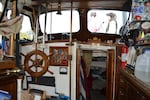
Think Out Loud host Dave Miller interviews river artist and self-described pirate, Phil Fake aboard his ship, Victory.
Phoebe Flanigan / OPB
From the three-bedroom boat on the lower Willamette River that he calls home, artist and self-styled pirate Phil Fake is working on
.
At a glance, it looks like something from the Romantic period — clouds cut a wide, cotton canopy across a brilliant blue sky; brightly colored houseboats form an orderly row between tall, white-capped pilings. Near the far shore, sailboats bob cheerfully on a slow current. The scene looks utterly serene.
Don't be fooled, said Fake.
"That painting might look like a beautiful panorama of this basin, but it's actually a political statement about some people who are very seriously arguing with each other."
Those sailboats? They're actually a "pirate fleet" illegally anchored on the river. The houseboats? Fake said they may be the source of a recent slew of complaints against river-dwellers like himself.
"It's likely that much of the complaints come from them, their property developers, the people in the West Hills, people in condos — basically anybody that has a view of the river is motivated to complain about the presence of itinerant boats," explained Fake.
Lori Warner-Dickason, the operations manager for the Oregon Department of State Lands (DSL), knows all about those complaints.
"We receive probably five to 10 complaints a week," Warner-Dickason told Think Out Loud's Dave Miller earlier this month.
Warner-Dickason said that public issues with river-dwellers range from noise complaints to concerns with pollution, safety, and aesthetics.
When the population of so-called itinerant boats exploded in 2010, those complaints drove DSL employees to modify the state's rule around transient boat use. The rule in place at the time allowed boaters to anchor for up two weeks in one location before they had to move. The regulation said nothing about how far they had to travel. But the new law, effective January 2013, says that boaters may only drop anchor for up to 30 days in any one location. After that, they have to move five nautical miles from their anchorage, and can't return to that location for a year.
The new transient boat use law has drawn the wrath of many a boat dweller. Fake called it "the most restrictive nautical regulation in the history of the planet Earth." Other liveaboards said it effectively drives them off of the lower Willamette River.
But here's the thing: though the law is more than two years old, it has yet to be enforced.
Why? That answer, Warner-Dickason said, is complicated.
"The population is fairly diverse," explained Warner-Dickason. "Some people are living on the water because they don't have an alternative. Some are choosing it as a lifestyle. So for those who don't have another alternative, we need to be sensitive to their situation."
In addition, said Warner-Dickason, enforcement is a resource intensive effort. "It takes a lot of resources from law enforcement, from agency staff ... And it would cost a considerable amount of money to seize vessels from those who weren't willing to comply."
The Department of State Lands is currently considering changes to the law, including a "2 Month 2 Mile" proposal put forth by liveaboard boaters. Those changes, however, would not come into effect until 2017. In the meantime, Warner-Dickason said DSL is preparing to begin enforcement efforts in earnest — likely within the next year and a half.
Unfortunately, said Warner-Dickason, that may mean putting some otherwise homeless people out of their aquatic homes. "You know, being on the waterway is not a safe housing alternative when you're just anchored out on the river."
Fake said he knows the dangers, but he's willing to assume the risks. "Whether I'm a Democrat or a Tea Partier, I'm not sure. But I do believe that freedom is a little more important than safety. I mean that's the main debate in making a law. It's always safety versus freedom. You can't not have laws. But I like to go toward freedom."